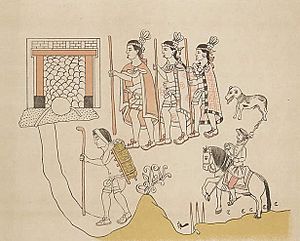Tlaxcaltec facts for kids
Quick facts for kids Tlaxcaltecatl (singular) Tlaxcalteca (plural) |
|
|---|---|
| Total population | |
| 23,000+ | |
| Regions with significant populations | |
| Mexico (Tlaxcala), United States | |
| Languages | |
| Tlaxcala–Puebla Nahuatl, Spanish | |
| Religion | |
| Catholicism mixed with traditional Nahua religion | |
| Related ethnic groups | |
| Nahuas, Otomi |
The Tlaxcalans (pronounced Tlash-KAH-lans), also known as Tlaxcaltecs, are a group of Nahua people. They live in the Mexican state of Tlaxcala.
Contents
Ancient Tlaxcalans: Before Europeans Arrived
The Tlaxcalans were originally made up of three different groups. These groups spoke Nahuatl, Otomi, and Pinome languages. They formed four important city-states in the Tlaxcala Confederation. Over time, the Nahuatl speakers became the main group.
The Tlaxcalans were very strong. Even though the Mexica people tried, the Tlaxcalans were never conquered by the powerful Aztec Triple Alliance. Some wars between the Tlaxcalans and the Aztecs were called xochiyaoyatl, or "flower wars." These wars were not about taking over land. Instead, they were fought to capture enemy warriors for special religious ceremonies.
Tlaxcalans and the Spanish: A New Alliance

The Tlaxcalans really wanted to defeat the Aztecs. The Aztecs were their biggest enemies. So, the Tlaxcalans decided to team up with Hernán Cortés and his Spanish conquistadors. This alliance was a huge help in the invasion of Tenochtitlan. Tenochtitlan was the capital city of the Aztec Empire.
The Tlaxcalans helped the Spanish reach the Valley of Anahuac. They also provided a large group of soldiers for the invasion. At that time, their leader, called a Tlatoani, was a man named Xicotencatl. His son, Xicotencatl the Younger, was the prince.
Because they helped the Spanish Crown conquer the Aztec Empire, the Tlaxcalans received special treatment. They had unique rights that other native groups in Mexico did not have. For example, they were allowed to carry guns, ride horses, and hold important titles. They could also rule their own towns without much interference. This special treatment made the Tlaxcalans loyal to Spain for many years. This loyalty continued even during the Mexican War of Independence.
The Tlaxcalans also played a key role in setting up new towns in Northern Mexico. The Spanish had trouble conquering the local tribes there. These tribes were known as the Chichimeca. The Tlaxcalans helped settle these areas. They helped to make peace with the local groups who were against the Spanish. They also worked in mines and on large farms called haciendas.
Tlaxcalan Settlements in Northern Mexico
The Tlaxcalan colonies in the Chichimeca region included towns in modern states like Coahuila, Durango, Jalisco, Nuevo León, San Luis Potosí, and Zacatecas. Some of these colonies became important cities today. For example, Nueva Tlaxcala de Nuestra Señora de Guadalupe de Horcasistas is now Guadalupe. Santiago de las Sabinas is now Sabinas Hidalgo in Nuevo León. Villa de Nueva Tlaxcala de Quiahuistlán is now Colotlán in Jalisco. And San Esteban de Nueva Tlaxcala in Coahuila is now part of Saltillo.
Tlaxcalans Today: Modern Times
According to the Mexican census from 2010, there are more than 23,000 people who speak Nahuatl. Many of these are descendants of the Tlaxcalan people.
See also
 In Spanish: Pueblo tlaxcalteca para niños
In Spanish: Pueblo tlaxcalteca para niños
 | Dorothy Vaughan |
 | Charles Henry Turner |
 | Hildrus Poindexter |
 | Henry Cecil McBay |

